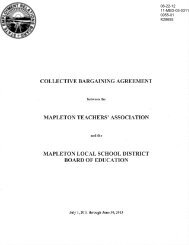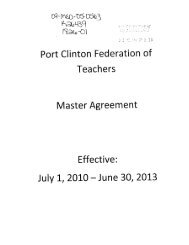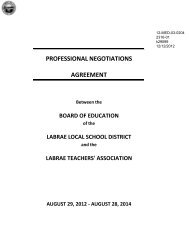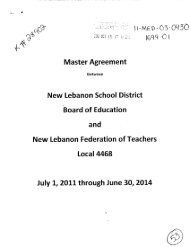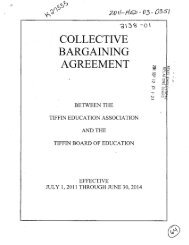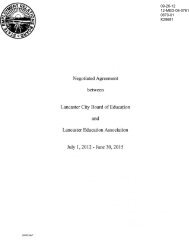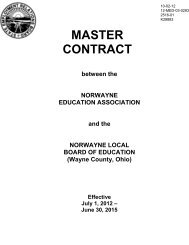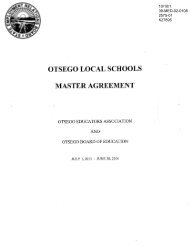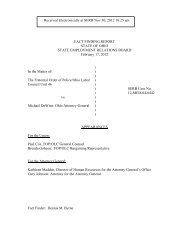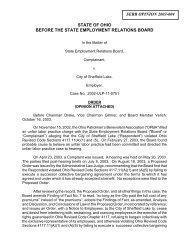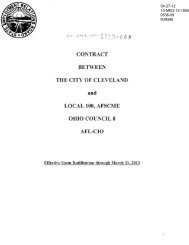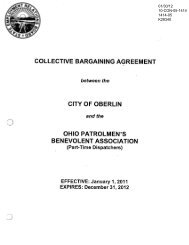Master Agreement 2005 - State Employment Relations Board
Master Agreement 2005 - State Employment Relations Board
Master Agreement 2005 - State Employment Relations Board
Create successful ePaper yourself
Turn your PDF publications into a flip-book with our unique Google optimized e-Paper software.
three(3) such observations shall be accomplished through<br />
prior arrangement with the professional. In addition, a<br />
maximum of three (3)such observations may be accomplished<br />
at the convenience of the building administrator<br />
provided the number of such observations does not exceed<br />
the number of observations accomplished through prior<br />
arrangement. When unusual conditions are deemed to<br />
exist, observations are not required if such observations<br />
would not substantively contribute to an evaluation of the<br />
unusual condition.<br />
2. Appraisal conferences are arranged for professionals who are<br />
identified in paragraphs A or C above.<br />
3. Goals for improvement, professional growth activities and the<br />
general statements section must be completed by the professional<br />
and the evaluator if one or more ratings of unsuccessful<br />
are recorded, except when an unusual condition is deemed to<br />
exist.<br />
4. The direct involvement in the evaluation process of persons<br />
other than building administrators or immediate supervisors<br />
shall be only under the following circumstances:<br />
A. TheHuman Resources Department may determine to<br />
become involved in cases where the building administrator<br />
or immediate supervisor (1) recommends an involuntary<br />
transfer, non-renewal of contract, termination of contract,<br />
or non-retention of a full-time hourly professional employee<br />
as a result of the SpecialEvaluation;or (2) when an<br />
unusualcondition is deemed to exist; or (3) upon the professional’s<br />
request.<br />
B. Area principals, supervisors (other than the professional’s<br />
immediate supervisor) and other personnel shall be<br />
involved upon a professional’s request or at the request of<br />
the building administrator or immediate supervisor. The<br />
role of area principals and supervisors directly involved in<br />
evaluation shall be to makerecommendations for improvement<br />
to the professional being evaluated and such recommendations<br />
may also be communicated to the evaluator.<br />
C. When an evaluation is being conducted as a result of a<br />
Special Notice and other personnel do observe the professional’s<br />
performance and make any type of report to the<br />
evaluator or other administrator, such report shall be provided<br />
in full to the professional in a conference among the<br />
professional, the evaluator or other administrator, and the<br />
observer. The professional shall be entitled to Association<br />
representation at such a conference.<br />
D. Finaldecisions as to a professional’s evaluation shall remain<br />
with the building administrator or immediate supervisor,<br />
except as provided in the PAR Program.<br />
E. Nothing in this Section 4 is intended to restrict the evaluator<br />
from consulting with the Human Resources Department<br />
about evaluation practices or procedures in general or<br />
to review the practices and procedures related to a specific<br />
evaluation of a professional.<br />
F. When the professional is in the PAR Program.<br />
249



